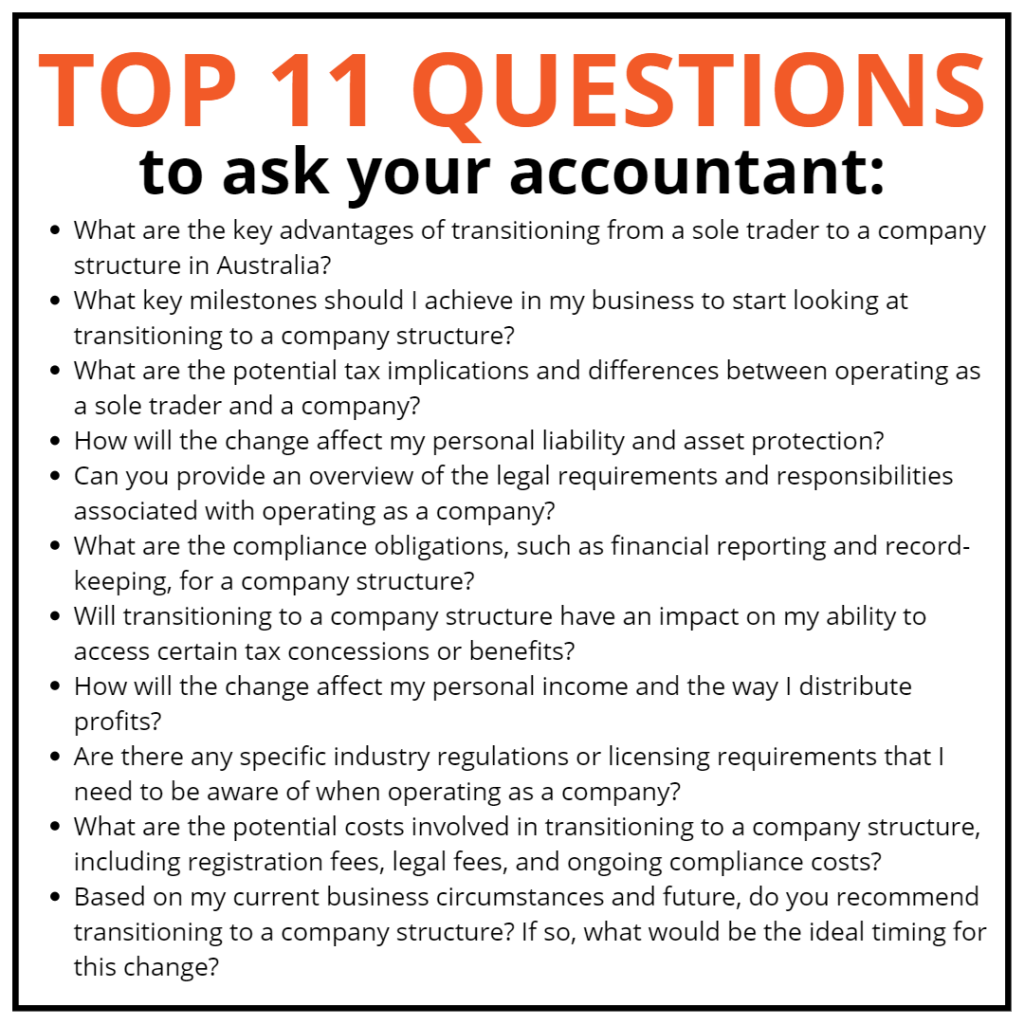Here are 5 reasons to talk with your accountant before considering the change.
In the world of small to medium-sized businesses in Australia, there often comes a point where the decision to transition from being a sole trader to establishing a company structure needs to be considered.
Hey, Kathryn here. I wanted to discuss one of the biggest business decisions that you might make as a business owner. However, before making any changes it is crucial to consult with us, your accountant.
We can provide valuable insights and guidance to ensure you make an informed choice that aligns with your business goals and financial situation. In this blog post, I will explore the difference between a sole trader and a company and present 5 reasons why discussing this change with your accountant is essential.
Sole Trader vs. Company
Before delving into the reasons for consulting your accountant, it’s important to understand the fundamental difference between a sole trader and a company.
Sole Trader: A sole trader is an individual who operates a business on their own, you are still required to register for an Australian Business Number (ABN). As a sole trader, you are personally liable for the debts and obligations of the business. The profits and losses generated by the business are considered personal income or deductions on your individual tax return.
Company: A company, on the other hand, is a separate legal entity from its owners, known as shareholders. A company requires formal registration with the Australian Securities and Investments Commission (ASIC).
The liability of those who own shares is limited to their shareholding unless they also act as a Director and have acted illegally or continued trading while the company is insolvent.
The company’s profits and losses are taxed separately from the individual shareholders.
Now that we have established the difference between a sole trader and a company, let’s explore why discussing this change with your accountant is crucial.
1. Legal and Compliance Requirements
Establishing a company involves various legal and compliance obligations that differ from those of a sole trader. We can guide you through these requirements and help you understand the implications and responsibilities associated with operating as a company. We can provide information about the necessary registrations, permits, and licenses, ensuring that you comply with all relevant laws and regulations.
2. Tax Implications
Transitioning from a sole trader to a company can have significant tax implications. We can assess your current tax situation and determine whether incorporating as a company would be beneficial from a tax perspective. We can explain the tax implications, such as changes in your reporting obligations, deductions, and tax rates. Additionally, we can advise you on the most tax-efficient structure for your business and help you navigate any potential pitfalls.
3. Asset Protection and Risk Management
Operating as a company offers certain advantages in terms of asset protection and risk management.
By separating your personal assets from your business liabilities, you can mitigate the risks associated with business activities. NGR Accounting can assess your business’s risk profile and advise you on the potential benefits of incorporating in terms of asset protection. We can help you understand the legal ramifications and liabilities associated with your business structure and recommend strategies to safeguard your personal assets.
4. Access to Capital and Funding Opportunities
Incorporating your business can open opportunities for accessing capital and securing funding. NGR Accounting can help you explore different funding options available to companies, such as bank loans, venture capital, or issuing shares. We can guide you through the process of preparing financial statements and business plans that meet the requirements of potential investors or lenders. Additionally, we can assist you in assessing the financial viability of your business and determining the most appropriate funding sources.
5. Long-Term Business Strategy
Transitioning from a sole trader to a company is a significant decision that should align with your long-term business strategy.
(If you want more information about Business Planning, check out our previous Blog, Are you Planning for the Short Term or the Long Term?)
At NGR Accounting, we can review your business goals, financial projections, and growth plans to determine if incorporating is the right move for you. We can provide valuable insights into the pros and cons of each business structure and help you evaluate the impact on your future. By considering your unique circumstances, we can offer strategic advice that supports your business’s overall objectives.
The decision to change from a sole trader to a company is an important one for small to medium-sized businesses. It is crucial to consult with the team at NGR Accounting before making any changes to ensure that you understand the implications and benefits associated with the transition.
NGR Accounting can provide guidance on:
- legal and compliance requirements,
- tax implications,
- asset protection,
- access to capital and funding opportunities, and
- long-term business strategy.
I would recommend having some questions to discuss your options with your accountant, and the top 11 questions are:

By seeking professional advice, you can make an informed decision that aligns with your business goals and maximises your chances of success. NGR Accounting is a trusted partner who can provide the expertise and support you need throughout this process.
If you have any questions, please feel free to contact NGR Accounting at 02 9011 6669 or via email at info@ngraccounting.com.au
FULL DISCLAIMER:
The information provided by our firm is of a general nature and does not consider your specific financial circumstances, needs, or objectives. The information is not intended to be relied upon as specific advice and should not be treated as such. Before making any financial decisions, we recommend that you seek professional advice tailored to your specific circumstances.
Whilst every effort has been made to ensure the accuracy of the information provided, we do not guarantee its accuracy, completeness, or suitability for your intended use. We are not liable for any loss or damage resulting from your reliance on the information provided.
Our firm is not responsible for the content of any third-party websites that may be linked to or from our website. The inclusion of any links does not imply our endorsement of the website. It is your responsibility to evaluate the accuracy, completeness and usefulness of any information provided by these third-party websites.
By accessing or using the information provided by our firm, you acknowledge and accept the terms of this disclaimer.
Updated: 13th July
JM

